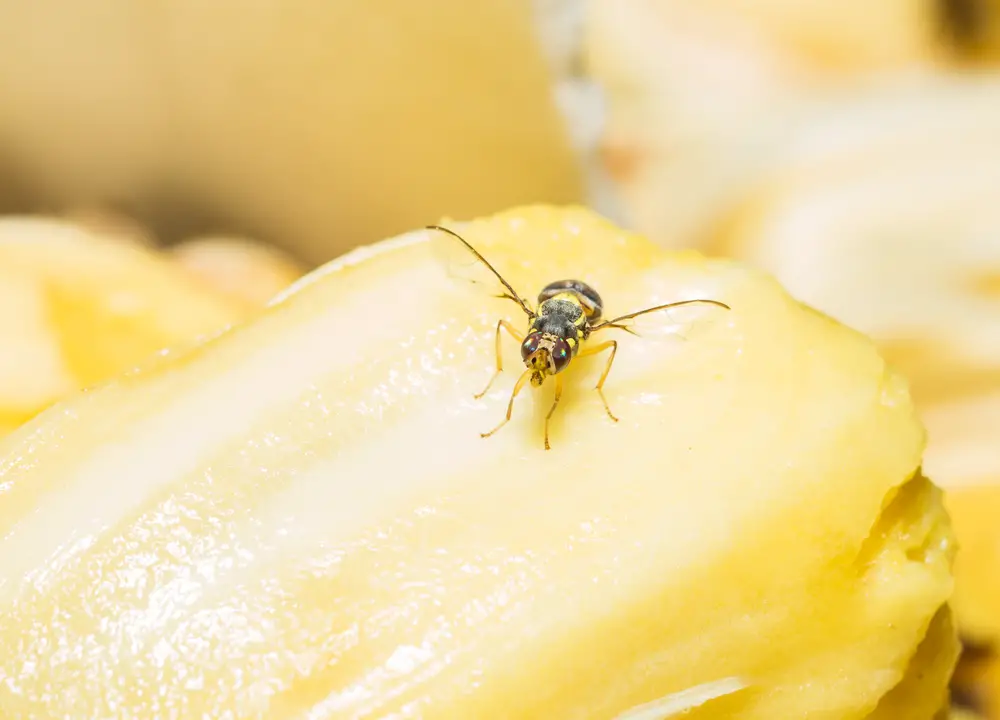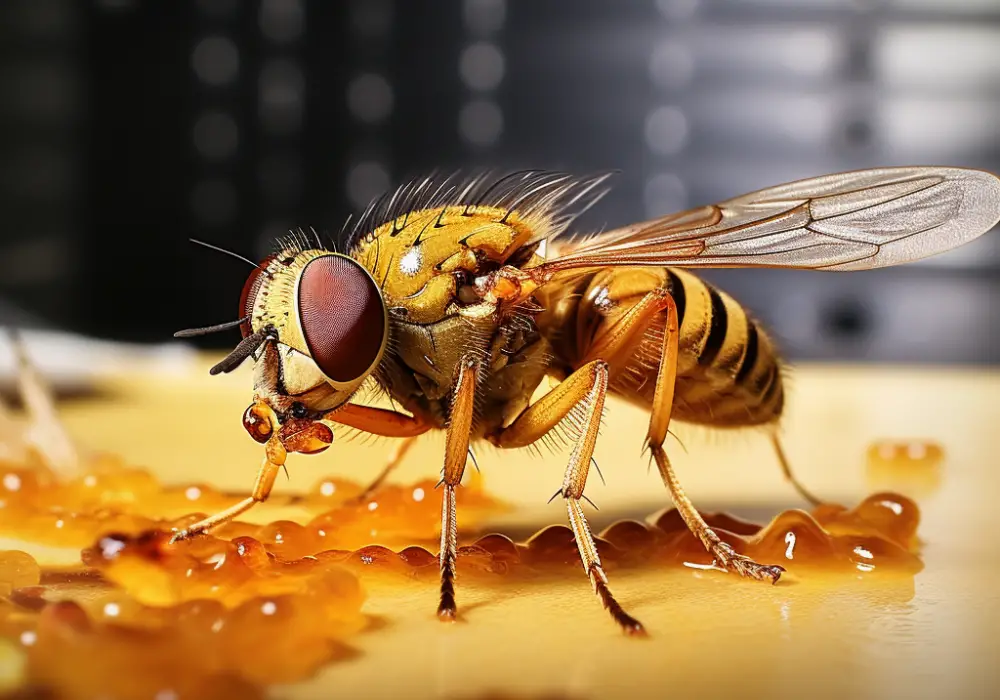Boiling water has long been a known method for disinfecting various objects and surfaces, as the high temperatures are effective at killing many bacteria and other microscopic organisms.
When it comes to fruit flies, these tiny nuisances not only pose a hygienic issue but can also be quite challenging to eliminate from your living space.
You might wonder if boiling water can be employed as a weapon in the battle against fruit flies and whether this approach is effective in eradicating them.
Quick Answer:
Boiling water can kill fruit flies, especially when poured into drains where they breed. But for controlling an active infestation, a trap with vinegar, wine, or a store-bought fruit fly trap is more efficient in trapping and eliminating these pests.
We will explore the efficacy of boiling water in eliminating them and what other tactics can be employed in keeping these unwanted pests at bay.
Does Boiling Water Kill Fruit Flies?
Boiling water is a well-known method for killing various types of bacteria, viruses, and other microorganisms.
Fruit flies, also known as Drosophila melanogaster, are small insects that can be a nuisance in homes, especially during warm weather. They are attracted to ripe or decaying fruits and other organic materials, where they lay their eggs.
These eggs then hatch into larvae, which feed on the rotting matter before developing into adult flies.
Now, the primary reason you may consider using boiling water to kill fruit flies is its high temperature. At temperatures above 122°F (50°C), most insects and larvae cannot survive, and boiling water is well above this threshold at 212°F (100°C). Consequently, pouring boiling water on fruit flies and their larvae can be lethal.
However, a few factors must be considered before relying on this method. First, the effectiveness of boiling water as a fruit fly control measure depends on direct contact with the insects and larvae.
This can be challenging, especially when the pests are hidden in hard-to-reach places, such as inside a fruit or in the small crevices of a drain.
Second, while boiling water may kill the fruit flies and larvae you manage to douse, it will not prevent new insects from entering your home and laying more eggs. This means that you’ll have to continuously use boiling water to address the problem, which can be both time-consuming and risky.
Boiling water can cause burns and damage certain surfaces or objects, so caution must be exercised.
Overall, boiling water can indeed kill fruit flies and their larvae when they come into direct contact with it. However, this method may not provide a long-term solution or address the root causes of infestation.
Life Cycle of Fruit Flies
Eggs
Fruit flies begin their life cycle as tiny, oval-shaped eggs, usually laid on the surface of ripe or fermenting fruits and vegetables. A female fruit fly can lay up to 500 eggs during her lifetime, and these eggs will hatch in just 24 to 30 hours.
Larvae
Once hatched, the fruit fly larvae, also known as maggots, emerge and start feeding on the fruit they were laid upon. This stage is critical for their growth and development, as they consume nutrients and grow rapidly.
The larval stage typically lasts between 4 to 6 days, during which they molt twice, shedding their exoskeleton to accommodate their expanding size.
At the end of the larval stage, the fruit fly larvae will seek out drier and darker areas within their environment to pupate. They will then encase themselves in a protective, hard-shell puparium, where they undergo their final transformation.
Adult Fruit Flies
The transformation from larva to adult fruit fly happens within the puparium. This process, called metamorphosis, takes around 4 to 5 days to complete. Once fully developed, the adult fruit fly emerges from the puparium, ready to begin its life as a mature insect.
Adult fruit flies have a relatively short lifespan of about 40-50 days, during which they primarily focus on finding food, mates, and suitable locations for laying eggs. Females are capable of mating and reproducing just 24 hours after emerging from the puparium, enabling the fruit fly population to grow rapidly.
The life cycle then repeats as the new generation of fruit flies lay their eggs and continues the cycle.
Causes of Fruit Fly Infestations
Ripe and Overripe Fruits
Fruit flies are attracted to ripe and overripe fruits, which serve as both a food source and a breeding ground. As fruit ripens, it releases sugar and fermentation products that attract these tiny pests.
To minimize the risk of infestations, store ripe fruits in the refrigerator and dispose of overripe fruits promptly.
Unclean Kitchens and Food Sources
An unclean kitchen can also contribute to fruit fly infestations. Leftover food particles, spills, and exposed food can attract fruit flies in search of nourishment. It is essential to maintain a clean kitchen by wiping down surfaces, storing food in sealed containers, and cleaning up spills as soon as they happen.
Compost and Organic Debris
Compost bins and organic debris in the garden are other common sources of fruit fly infestations. Fruit flies feed on the decomposing organic matter, using it as a food source and a place to lay their eggs.
To prevent infestations, properly maintain compost bins and keep them covered to eliminate potential attractants.
| Tips for compost management |
|---|
| 1. Keep compost bin sealed |
| 2. Turn compost regularly |
| 3. Keep organic waste buried |
| 4. Place bin away from your home |
Drains and Garbage Disposals
Drains and garbage disposals are another breeding ground for fruit flies, as they often contain rotting food and organic matter. These dark and damp environments provide the perfect conditions for egg-laying and reproduction.
To prevent infestations, regularly clean drains and garbage disposals to remove any rotting food and build-up. Use drain cleaners and flush with boiling water to help eliminate potential breeding grounds.
Preventing and Getting Rid of Fruit Flies

Keeping Your Home Clean
An important step in getting rid of fruit flies and preventing their return is keeping your home clean. Regularly wipe down surfaces, sweep floors, and clean spills immediately. By maintaining a clean environment, you’ll make it difficult for fruit flies to lay their eggs and breed.
Proper Fruit and Produce Storage
Proper fruit and produce storage is crucial in preventing a fruit fly infestation. Store ripe fruits and vegetables in the refrigerator, as this will slow down their ripening process and deter fruit flies. For fruits and vegetables that cannot be refrigerated, use sealed containers or mesh bags to keep them fresh and fruit fly-free.
Sealing Doors and Windows
To prevent fruit flies from entering your home, seal doors and windows. Check for gaps around window frames and doorways, and repair any cracks or crevices that could serve as entry points. Installing screens on all exterior windows will also help keep fruit flies and other pests out.
Regularly Taking out the Garbage
Fruit flies love accumulating organic waste, so regularly taking out the garbage is essential. Ensure trash cans have airtight lids, and empty them frequently to remove any food waste that could attract pests. Regularly cleaning your trash can with a diluted bleach solution will also help eliminate any lingering fruit fly eggs or larvae.
Fruit Fly Traps and Solutions
Vinegar and Dish Soap Trap
A popular and effective method to eliminate fruit flies is the vinegar and dish soap trap. Apple cider vinegar or regular vinegar attracts fruit flies due to its aroma.
To create this trap, simply mix a few drops of dish soap with a small amount of vinegar in a shallow dish. The dish soap breaks the surface tension of the vinegar, causing the fruit flies to drown.
Wine and Plastic Wrap Trap
Another effective fruit fly trap involves using wine and plastic wrap. Fruit flies are also attracted to the sweet smell of wine. To create this trap, pour some wine into a container (a used wine bottle works great) and cover the opening with plastic wrap.
Poke small holes in the plastic wrap, allowing fruit flies to enter but making it difficult for them to escape.
Beer Trap
The beer trap is a similar method to the wine and plastic wrap trap. Fruit flies are attracted to the fermented smell of beer. To create this trap, fill a container with beer and add a drop of dish soap. The dish soap will break the surface tension of the beer, causing fruit flies to drown upon contact.
Sticky Paper and Light Trap
Fruit flies are attracted to light, making the sticky paper and light trap a viable solution. To create this trap, hang sticky paper near a light source. As the fruit flies approach the light, they will become stuck to the sticky paper, effectively trapping them.
Alternative Pest Control Methods
Besides boiling water, there are other methods to combat fruit flies effectively. In this section, we will discuss alternative pest control methods such as Drain Cleaners and Baking Soda, Air Purifiers and Fans, and Professional Pest Control Help.
Drain Cleaners and Baking Soda
Drain cleaners can be an effective way to clear drains of organic material and larval breeding grounds. Regularly using drain cleaners will help eliminate potential sources of fruit fly infestations. Another eco-friendly option is using baking soda and vinegar.
Mix equal parts of baking soda and vinegar and pour it down the affected drain. Let it sit for a few hours or overnight, and then flush it with hot water. This mixture helps to break down the organic matter in the drains and deter fruit flies.
Air Purifiers and Fans
Air purifiers and fans can also help reduce the number of fruit flies. Air purifiers can pull fruit flies and other pests out of the air and trap them in the filter. This prevents their spread and reproduction.
Additionally, fans can help as fruit flies are weak fliers and struggle against air currents. Strategically placing fans can help protect vulnerable areas like kitchen countertops or dining tables.
| Method | Benefits | Limitations |
|---|---|---|
| Air Purifier | – Traps fruit flies in the filter – Cleans the air | – May not cover large areas – May require frequent filter changes |
| Fans | – Disrupts fruit fly flying capabilities – Protects vulnerable areas | – Limited control capabilities |
Professional Pest Control Help
In cases of persistent or severe infestations, it may be beneficial to consult a professional pest control service or an entomologist. They can help identify the source of the infestation, provide customized treatment plans, and give recommendations for preventing future issues.
Keep in mind that professional help may come at a higher cost than DIY methods but can save time and effort in the long run.
Remember, being proactive with pest control measures and maintaining a clean environment can greatly reduce the chances of fruit fly infestations. Experiment with these alternative methods to find the best approach for your particular situation.
Conclusion
Boiling water can indeed be an effective method to kill fruit flies. When you pour boiling water down drains or on surfaces where fruit flies are present, the high temperature kills them almost instantly.
Additionally, it can help destroy their eggs and larval stages, thus preventing future infestations.


